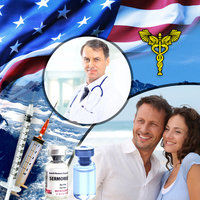Introduction
Testosterone, the primary male sex hormone, plays a crucial role in various aspects of men's health, including muscle mass, bone density, and sexual function. In recent years, low testosterone levels, or hypogonadism, have become a growing concern among American males. This article delves into the impact of developmental health on testosterone levels, shedding light on the factors that may contribute to this condition and offering insights into potential preventive measures.
The Importance of Testosterone
Testosterone is essential for the development and maintenance of male reproductive tissues, such as the testes and prostate, as well as secondary sexual characteristics, including facial and body hair growth. Beyond its role in sexual health, testosterone influences mood, cognitive function, and overall well-being. Low testosterone levels can lead to a range of symptoms, including decreased libido, erectile dysfunction, fatigue, and depression.
Developmental Health and Testosterone
Emerging research suggests that developmental health, particularly during fetal development and early childhood, may have a significant impact on testosterone levels later in life. Factors such as maternal nutrition, exposure to environmental toxins, and stress during pregnancy can influence the development of the hypothalamic-pituitary-gonadal (HPG) axis, which regulates testosterone production.
Maternal Nutrition and Fetal Development
Adequate maternal nutrition is crucial for the healthy development of the fetus, including the HPG axis. Studies have shown that maternal deficiencies in essential nutrients, such as vitamin D, zinc, and omega-3 fatty acids, may be associated with lower testosterone levels in offspring. Ensuring proper maternal nutrition during pregnancy may help optimize the development of the HPG axis and support healthy testosterone levels in adulthood.
Environmental Toxins and Endocrine Disruptors
Exposure to environmental toxins and endocrine-disrupting chemicals (EDCs) during critical periods of development can also impact testosterone levels. EDCs, found in pesticides, plastics, and personal care products, can interfere with the normal functioning of the endocrine system, potentially leading to hormonal imbalances. Minimizing exposure to these substances during pregnancy and early childhood may help reduce the risk of low testosterone levels later in life.
Stress and the HPG Axis
Chronic stress during pregnancy and early childhood can also affect the development of the HPG axis. Elevated levels of stress hormones, such as cortisol, can disrupt the delicate balance of the endocrine system, potentially leading to lower testosterone production. Promoting a stress-free environment during these critical periods may help support healthy testosterone levels in adulthood.
Lifestyle Factors and Testosterone
While developmental health plays a significant role in testosterone levels, lifestyle factors in adulthood can also influence hormone production. Regular exercise, a balanced diet, and adequate sleep are essential for maintaining optimal testosterone levels. Engaging in resistance training and high-intensity interval training (HIIT) has been shown to boost testosterone production, while a diet rich in healthy fats, protein, and micronutrients can support hormone synthesis.
Conclusion
The impact of developmental health on testosterone levels in American males is a complex and multifaceted issue. Factors such as maternal nutrition, exposure to environmental toxins, and stress during critical periods of development can influence the HPG axis and potentially contribute to low testosterone levels later in life. By understanding these factors and taking proactive steps to optimize developmental health, we can work towards reducing the prevalence of hypogonadism and promoting overall male health and well-being.
Contact Us For A Fast And Professional Response

- Environmental Toxins and Declining Testosterone Levels in American Men: A Growing Concern [Last Updated On: March 10th, 2025] [Originally Added On: March 10th, 2025]
- Chronic Illness and Low Testosterone in American Males: Impacts and Management Strategies [Last Updated On: March 17th, 2025] [Originally Added On: March 17th, 2025]
- Managing Low Testosterone in Aging Men: Symptoms, Causes, and Treatment Options [Last Updated On: March 19th, 2025] [Originally Added On: March 19th, 2025]
- Low Testosterone's Impact on Cognitive Function in American Men: Interventions and Insights [Last Updated On: March 19th, 2025] [Originally Added On: March 19th, 2025]
- Low Testosterone and Mood Disorders in American Men: A Comprehensive Overview [Last Updated On: March 19th, 2025] [Originally Added On: March 19th, 2025]
- Low Testosterone in American Males: Symptoms, Causes, and Management Strategies [Last Updated On: March 19th, 2025] [Originally Added On: March 19th, 2025]
- Vitamin D's Role in Managing Low Testosterone in American Men: Insights and Strategies [Last Updated On: March 19th, 2025] [Originally Added On: March 19th, 2025]
- Low Testosterone's Rising Economic Impact on American Healthcare [Last Updated On: March 19th, 2025] [Originally Added On: March 19th, 2025]
- Alcohol Consumption and Its Effects on Testosterone Levels in Men [Last Updated On: March 20th, 2025] [Originally Added On: March 20th, 2025]
- Low Testosterone in American Men: Symptoms, Diagnosis, and Treatment Options [Last Updated On: March 20th, 2025] [Originally Added On: March 20th, 2025]
- Low Testosterone: Impacts on Prostate Health and Cancer Risk in American Men [Last Updated On: March 20th, 2025] [Originally Added On: March 20th, 2025]
- Low Testosterone's Impact on Muscle Mass and Strength in American Males [Last Updated On: March 21st, 2025] [Originally Added On: March 21st, 2025]
- Low Testosterone's Impact on Skin Health in American Men: Causes and Management [Last Updated On: March 22nd, 2025] [Originally Added On: March 22nd, 2025]
- Smoking's Impact on Testosterone Levels in American Men: Health Risks and Quitting Strategies [Last Updated On: March 22nd, 2025] [Originally Added On: March 22nd, 2025]
- Low Testosterone and Diabetes: Managing Dual Health Challenges in American Males [Last Updated On: March 22nd, 2025] [Originally Added On: March 22nd, 2025]
- Low Testosterone's Impact on Immune Function in American Males: Insights and Management [Last Updated On: March 23rd, 2025] [Originally Added On: March 23rd, 2025]
- Common Medications Linked to Low Testosterone in American Men: Insights and Management [Last Updated On: March 23rd, 2025] [Originally Added On: March 23rd, 2025]
- Zinc's Role in Boosting Testosterone Levels in American Men [Last Updated On: March 23rd, 2025] [Originally Added On: March 23rd, 2025]
- Shift Work's Impact on Testosterone Levels in American Men: Insights and Strategies [Last Updated On: March 23rd, 2025] [Originally Added On: March 23rd, 2025]
- Low Testosterone and Osteoporosis Risk in American Males: Insights and Strategies [Last Updated On: March 23rd, 2025] [Originally Added On: March 23rd, 2025]
- Low Testosterone and Heart Disease Risk in American Men: Current Insights [Last Updated On: March 23rd, 2025] [Originally Added On: March 23rd, 2025]
- Weight Loss Boosts Testosterone: A Vital Strategy for American Males [Last Updated On: March 23rd, 2025] [Originally Added On: March 23rd, 2025]
- Low Testosterone: Symptoms, Impacts, and Treatment Options for American Men [Last Updated On: March 24th, 2025] [Originally Added On: March 24th, 2025]
- Low Testosterone in Aging Men: Symptoms, Diagnosis, and Treatment Options [Last Updated On: March 24th, 2025] [Originally Added On: March 24th, 2025]
- Chronic Stress and Testosterone: Impacts and Management Strategies for American Men [Last Updated On: March 24th, 2025] [Originally Added On: March 24th, 2025]
- Liver Health's Crucial Role in Managing Testosterone Levels for American Males [Last Updated On: March 24th, 2025] [Originally Added On: March 24th, 2025]
- Chronic Inflammation's Impact on Testosterone Levels in American Males: A Comprehensive Analysis [Last Updated On: March 25th, 2025] [Originally Added On: March 25th, 2025]
- Low Testosterone Linked to Increased Autoimmune Disease Risk in American Men [Last Updated On: March 25th, 2025] [Originally Added On: March 25th, 2025]
- Low Testosterone and Hair Loss in American Males: Mechanisms, Impacts, and Interventions [Last Updated On: March 25th, 2025] [Originally Added On: March 25th, 2025]
- Low Testosterone in American Males: Impact on Libido and Quality of Life [Last Updated On: March 25th, 2025] [Originally Added On: March 25th, 2025]
- Dietary Impact on Testosterone: Insights for American Men's Hormonal Health [Last Updated On: March 25th, 2025] [Originally Added On: March 25th, 2025]
- Herbal Supplements for Low Testosterone: Benefits, Limitations, and Key Herbs Reviewed [Last Updated On: March 25th, 2025] [Originally Added On: March 25th, 2025]
- Nutritional Deficiencies and Low Testosterone in American Males: Insights and Strategies [Last Updated On: March 26th, 2025] [Originally Added On: March 26th, 2025]
- Low Testosterone's Impact on Emotional Wellbeing in American Males: Symptoms and Solutions [Last Updated On: March 26th, 2025] [Originally Added On: March 26th, 2025]
- Low Testosterone and Depression in American Men: Links, Mechanisms, and Treatment Options [Last Updated On: March 26th, 2025] [Originally Added On: March 26th, 2025]
- Low Testosterone and Anemia: Impacts and Management in American Men [Last Updated On: March 26th, 2025] [Originally Added On: March 26th, 2025]
- Low Testosterone's Impact on American Males: Body Composition and Health Challenges [Last Updated On: March 26th, 2025] [Originally Added On: March 26th, 2025]
- Low Testosterone Linked to Dermatological Issues in American Men: A Comprehensive Overview [Last Updated On: March 26th, 2025] [Originally Added On: March 26th, 2025]
- Exercise Boosts Testosterone: A Guide for American Men [Last Updated On: March 26th, 2025] [Originally Added On: March 26th, 2025]
- Low Testosterone and Metabolic Syndrome: Risks and Prevention in American Men [Last Updated On: March 26th, 2025] [Originally Added On: March 26th, 2025]
- Genetic Factors Influencing Low Testosterone in American Males: A Comprehensive Overview [Last Updated On: March 27th, 2025] [Originally Added On: March 27th, 2025]
- Low Testosterone Linked to Neurological Risks in American Men: Implications and Interventions [Last Updated On: March 27th, 2025] [Originally Added On: March 27th, 2025]
- Low Testosterone and Thyroid Disorders: Impact and Management in American Men [Last Updated On: March 27th, 2025] [Originally Added On: March 27th, 2025]
- Sleep Apnea's Impact on Testosterone Levels in American Males: A Comprehensive Analysis [Last Updated On: March 27th, 2025] [Originally Added On: March 27th, 2025]
- Low Testosterone Linked to Increased Kidney Disease Risk in American Men [Last Updated On: March 27th, 2025] [Originally Added On: March 27th, 2025]
- Hormonal Imbalance and Low Testosterone: Causes, Symptoms, and Treatment in American Males [Last Updated On: March 28th, 2025] [Originally Added On: March 28th, 2025]
- Low Testosterone and Insulin Resistance: Impact and Management in American Men [Last Updated On: March 28th, 2025] [Originally Added On: March 28th, 2025]
- Environmental Estrogens and Their Impact on Testosterone Levels in American Males [Last Updated On: March 28th, 2025] [Originally Added On: March 28th, 2025]
- Chronic Pain's Impact on Testosterone Levels in American Males: Management Strategies [Last Updated On: March 28th, 2025] [Originally Added On: March 28th, 2025]
- Dental Health's Role in Managing Low Testosterone in American Males [Last Updated On: March 28th, 2025] [Originally Added On: March 28th, 2025]
- Gut Health and Testosterone: Optimizing GI Function for Hormonal Balance in American Men [Last Updated On: March 29th, 2025] [Originally Added On: March 29th, 2025]
- Respiratory Health's Impact on Testosterone Levels in American Males [Last Updated On: March 30th, 2025] [Originally Added On: March 30th, 2025]
- ENT Health's Crucial Role in Managing Testosterone Levels in American Males [Last Updated On: April 1st, 2025] [Originally Added On: April 1st, 2025]
- Low Testosterone's Impact on Musculoskeletal Health in American Men: Risks and Interventions [Last Updated On: April 2nd, 2025] [Originally Added On: April 2nd, 2025]
- Low Testosterone Linked to Eye Disorders in American Men: Emerging Evidence and Implications [Last Updated On: April 3rd, 2025] [Originally Added On: April 3rd, 2025]
- Reproductive Health and Testosterone: Impacts and Management in American Males [Last Updated On: April 4th, 2025] [Originally Added On: April 4th, 2025]
- Low Testosterone Levels Increase Infectious Disease Risk in American Men: Current Insights [Last Updated On: April 6th, 2025] [Originally Added On: April 6th, 2025]
- Immunological Health's Impact on Testosterone Levels in American Males: A Comprehensive Analysis [Last Updated On: April 6th, 2025] [Originally Added On: April 6th, 2025]
- Low Testosterone and Urological Health Risks in American Men: Detection and Management [Last Updated On: April 7th, 2025] [Originally Added On: April 7th, 2025]
- Testosterone and Endocrine Health: Diagnosis, Treatment, and Monitoring in American Males [Last Updated On: April 7th, 2025] [Originally Added On: April 7th, 2025]
- Cancer's Impact on Testosterone Levels in American Men: Causes and Management Strategies [Last Updated On: April 8th, 2025] [Originally Added On: April 8th, 2025]
- Low Testosterone Linked to Increased Risk of Hematological Disorders in American Men [Last Updated On: April 10th, 2025] [Originally Added On: April 10th, 2025]
- Low Testosterone Linked to Increased Psychiatric Disorder Risk in American Men [Last Updated On: April 10th, 2025] [Originally Added On: April 10th, 2025]
- Wound Healing's Impact on Testosterone Levels in American Males [Last Updated On: April 11th, 2025] [Originally Added On: April 11th, 2025]
- Low Testosterone in American Men: Impacts on Surgical Complications and Mitigation Strategies [Last Updated On: April 11th, 2025] [Originally Added On: April 11th, 2025]
- Rheumatological Health and Low Testosterone Management in American Males: Strategies and Insights [Last Updated On: April 12th, 2025] [Originally Added On: April 12th, 2025]
- Trauma's Impact on Testosterone Levels in American Males: Causes, Effects, and Management [Last Updated On: April 13th, 2025] [Originally Added On: April 13th, 2025]
- Low Testosterone and Vascular Health Risks in American Men: Detection and Management [Last Updated On: April 14th, 2025] [Originally Added On: April 14th, 2025]
- Low Testosterone and Genetic Disorders: Risks and Prevention Strategies for American Men [Last Updated On: April 15th, 2025] [Originally Added On: April 15th, 2025]
- Low Testosterone Linked to Increased Allergy Risk in American Men: Insights and Prevention [Last Updated On: April 16th, 2025] [Originally Added On: April 16th, 2025]
- Low Testosterone and Congenital Disorders in American Men: Risks and Management Strategies [Last Updated On: April 18th, 2025] [Originally Added On: April 18th, 2025]
- Anesthetics' Impact on Testosterone Levels in American Males: Management Strategies [Last Updated On: April 18th, 2025] [Originally Added On: April 18th, 2025]

















